#object vs. meta levels
Explore tagged Tumblr posts
Text
I have a lot of mixed thoughts nowadays about the "threat to democracy" angle to Trump's potential re-presidency.
On the one hand, Trump has made it abundantly clear, from long before the period of the 2020 campaign season when he began priming his base to expect the election to be rigged against him, that he has a fundamentally antidemocratic mentality, that for him, the concept of "democracy" is what it means to a (not particularly bright) second-grader: a fancy word for something that in the US we say we value all the time but which doesn't mean anything of significance. He has instilled a similar mentality among his cult following, and it's eroding our collective sense of what it means to be the United States and our once robust underlying trust (across political ideologies) in our system of elections. It already culminated in the events of January 2021, which made our country an embarrassment to the world and suggests that more violence and strife is in our future as long as he's on the political scene (even if Harris wins in November, I'm dreading how the Trumpists are going to react).
For me on a gut level, the deepest pang of insult and disgust (among very many!) associated with Trump getting into the White House again comes from the idea that he's unqualified not only in his inability to competently handle object-level issues but on the meta level of having no respect whatsoever for democracy, which to me represents the error-correcting mechanism of supreme importance in any system and the primary feature that, uh, makes America great (and revolutionary, back in the 18th century).
But then, at the same time... let's say he wins again. Where does his disrespect for democracy lead, exactly?
Trump has very deliberately undermined trust among his base in elections, and this time around he'll do better with appointing people in crucial positions who will fix elections for him, but what will this mean, concretely? It seems to me that the worst I can conceive of, without inventing scenarios that go completely off the rails, is that Trump manages to find the energy and knowhow to fix the results of a number of 2026 midterm elections and then get through more legislation in the second half of his term than he would have and maybe this includes an abolishment of term limits so that he could run again and fix the results to win again. This does seem quite bad, but it's also pretty far-fetched that he'd actually be able to do all this (starting with doctoring the visible results of a great enough number of midterm races to make a real difference), and anyway, the damage done would be severely hampered by (1) the fact that he'll be getting into his 80's and seems quite likely to drop dead quite suddenly, and (2) his lack of actual focused ideological beliefs (like what's he actually going to try to accomplish with one or two more terms?) -- he's seeking to get back into the White House basically because campaigning is fun and power and attention feel good and it's a way of screwing around and keeping the law from catching up with him.
Maybe I'm lacking in imagination on this, and I do remember Sam Harris having someone on his podcast who described a very concrete scenario of Trump eroding democracy if back in power that sounded pretty scary the way it was spoken at the time, but I can't remember the details now. Meanwhile, the recent Supreme Court decision about presidential immunity seems murky and up to interpretation and like it would maybe require a pretty contrived situation to allow Trump to get away with something truly dictatorial.
I think it's good that Democrats are reminding voters over and over again how incredibly offensive Trump is with regard to his attitude towards our democratic ideals; it seems that a lot of Americans care about this (rightly) and it will help Trump get defeated. That said, I don't know that it does any favors to throw around such vague and dramatic phrases as "will destroy democracy" though. First of all, what does that mean? Secondly, to the extent that it exaggerates the situation, it sounds hysterical, which is something the other side can always capitalize on. I suspect it has, at least in that Trump himself has noticed on some level that he can use desperate and freaked-out-sounding rhetoric from the other side as fodder for trolling.
It really bothers me the way the anti-Trump side has completely taken the bait in moments like Trump's comments about how he'll be a dictator on day one only. It would be one thing to be upset and offended because Trump's cult has flaunted the democratic process and the perception of it in serious ways and so it's in extremely bad taste for him of all people to be flippant and joking about it. It's another thing to hear the "I'll be a dictator but only on day one" comment and conclude in a serious tone, "See? He just admitted right out that he wants to be a dictator!", as if we shouldn't all have the collective psychological intelligence to understand that speaking that way is a form of mischievous, irreverent, trolling-while-projecting-a-strongman humor that Trump has always specialized in (and is indeed what makes him so refreshing to so many people).
I'm similarly really annoyed at the reactions -- including from such smart and sensible commentators as David Pakman -- to Trump's recent remark to a Christian audience about going out and voting just this one time and then he'll "fix" it so they won't have to vote again. I heard that the first time, and it was fairly obvious to me that there were several more likely explanations as to what he meant in context apart from "I'm going to make myself dictator for life" -- the first one that came to my head was "the main reason why a lot of Christians vote is the abortion issue, and Trump is implying that he'll 'fix it', meaning get an amendment passed banning abortion everywhere". Then I saw in an clip from a Trump interview afterwards (I only saw this because it was played by David Pakman I think, though he professed not to understand any sense of what Trump was saying) that Trump's explanation for the remark had to do with Christians not voting in very large numbers. ("I know you don't always care enough to vote, but do it just this once and then you won't have to again" actually sounds very close to the usual line, popular on the liberal side, about "this is the most important election of our lives", with my own personal addition of "vote to resoundingly defeat MAGA so that maybe the each subsequent election won't continue to be the most important of our lives.") I found out today from Matt Lewis' weekly podcast episode with Bill Scher that the context of Trump being concerned about low Christian voter turnout was in fact plainly acknowledged in earlier parts of Trump's same speech, although Scher says that the oft-cited notion of Christians not voting is a myth. Trump's confident claims that he'll "fix everything" are characteristic of him (and one of his main recognized demagogic rhetorical faults he's ridiculed for!) and a much less athletic explanation for his comment than "I'll change the country so that there won't be any elections", a thing that he's never said or implied.
Of course, if Trump cared a shred about truly assuring people that he has no dictatorial inclinations, he would be careful not to make comments that could even remotely be interpreted as such, and one could argue that in that context his "vote for me now and I'll fix it so that you won't need to again" comment was offensive. I'm not sure whether he maybe even intended that comment to be misinterpreted by his opponents this way so as to rile them up, although I seriously doubt that he was being that clever. I just wish people would stop feeding the troll and walking right into the trap of interpreting as much as possible in terms of "destroying our democracy" and treating every remark Trump says as a way of taking the man much more seriously than he deserves, even while at the same time we could simultaneously call attention to the seriously threatening aspects of Trump and Trumpism.
#election lunacy 2024#our last president#democracy#january 6th#object vs. meta levels#sam harris#presidential immunity#david pakman#american christians
7 notes
·
View notes
Text
Trails of Love Hori's been paving down in the build up for the series' ending
Part I: The Shape of an Eternal Bond
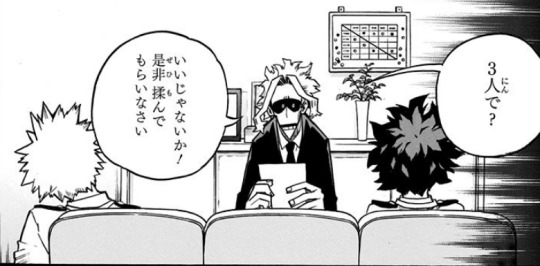



Romantic Love. Falling in love. When we break it down, what really is it, but a deep emotional connection formed with someone, an overpowering instinct that screams at you to protect that person, and the vulnerability you allow yourself to succumb to when your logical 'self-preserving' mind and it's hurt-proof walls is completely overrun by your heart's most based need to be close with them, the object of your affection.
And who shows these feelings for each other the most in BNHA? Bakudeku, right? Of course it's them.
It's something so obvious and yet this somehow feels overlooked by almost everyone in the fandom: I’ve never actually seen Izuku feeling happy or excited about his relationship with Ochaco, nor elated about getting to spend more time with her. But Izuku and Kacchan? The feelings they both have of longing to be closer to the other and every single action they took for that, chaotically and passionately smashes the "stable pleasantness" of IzuOcha right out of the park.


Izuku views getting to speak 'normally(?)' with Kacchan as a miracle on the exact same level of importance as being mentored by the greatest hero of their generation (and his U.A. room looks like what it looks like). This scene gave the cutest 'Work life: check. Love life: check' vibe.
Is it really all that surprising that BKDK have had plenty of development in this area while IzuOcha has had almost none? In fact, as BkDk became closer, the "expected end game" pair has gone in the opposite direction. And why does this not strike odd to "bkdk canon" doubters or the fans that ship IzuOcha? It really is no coincidence how many moments we’ve accrued about this mutual feeling and attraction that exists only between Izuku and Katsuki.
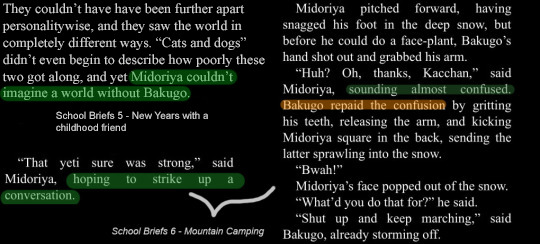
I want to be closer to you. I can't imagine life without you. vs Why are you so confused when I show you I care about you, too?
It's so simple - but maybe it being so simple is why this is not something we really stop and take a minute to think about specifically. About how this 'obvious' concept of two people desiring to become closer is one often shared between lovers and those who are falling in love.
And how that fits with bkdk because this longing for deeper connection has existed between them almost since the beginning... and we haven't been talking enough about it.
I want you to think about the true feelings and meaning lying behind these moments that have inspired the writings of many fic and meta:
Izuku's desperation and suffering at Kacchan being taken away...
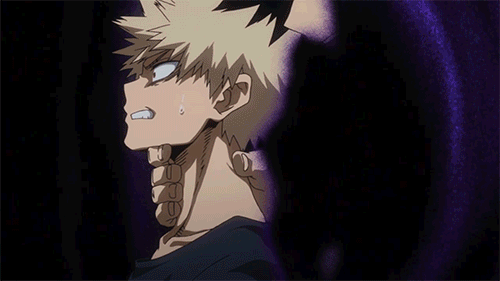
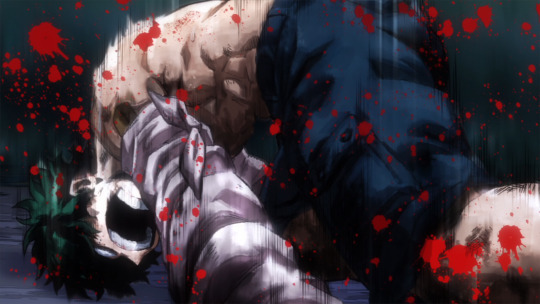
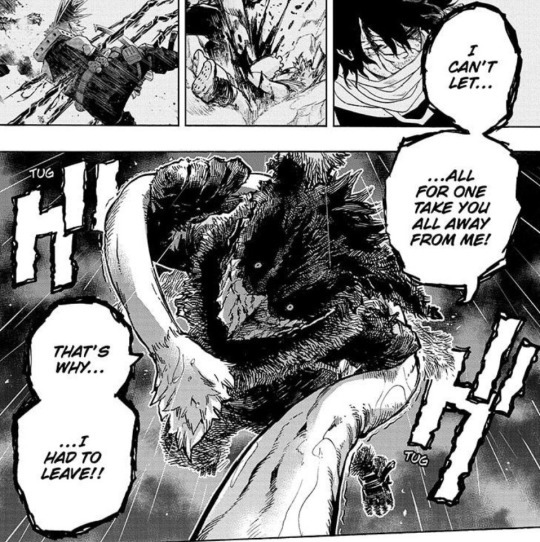
the hurt and loneliness that pools within Katsuki's heart from his fear of being left behind (and alone) by Izuku...



the regret they both felt in not using their own hand to reach out and connect to each other (believing their hand 'wouldn't be enough') and putting those feelings aside to prioritise their boy's rescue and safety...
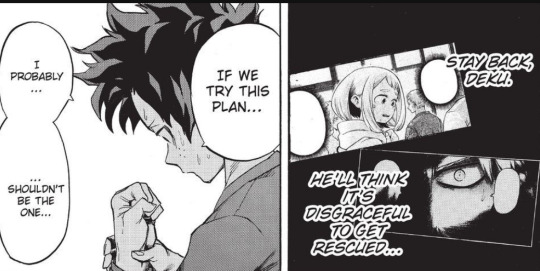
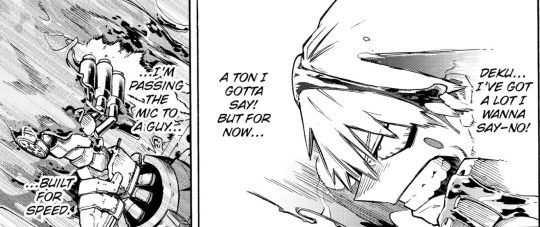

the distress Katsuki felt in facing his biggest fear of all - losing Izuku for good - forcing him to become a true hero, for his sake...
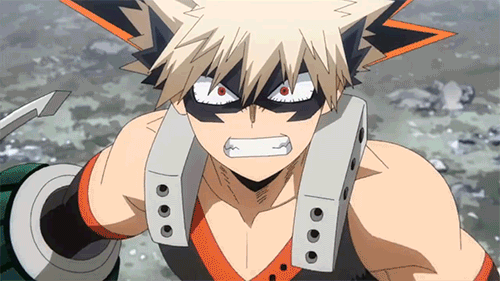


and the total overwhelming despair Izuku felt in realising he didn't make it in time and he had lost his hero.
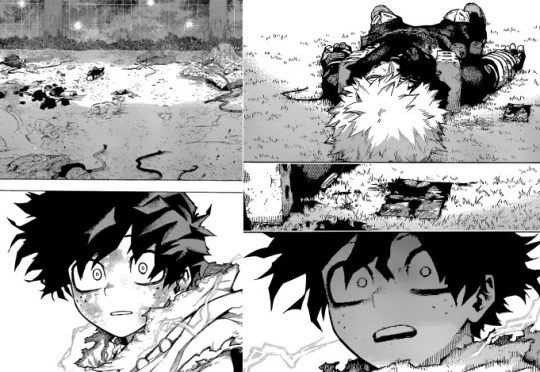
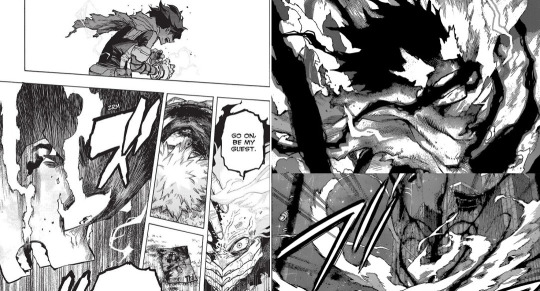
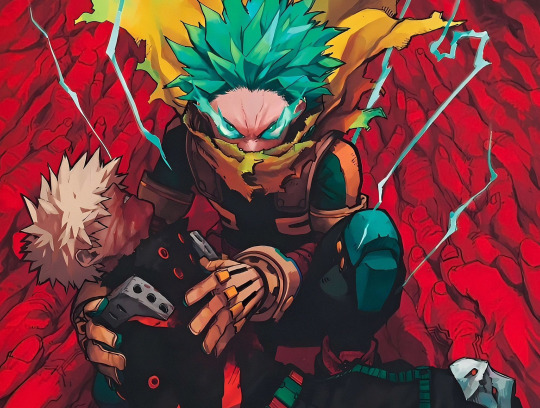
This is it, this cover was Hori locking them in. Holding his Kacchan so precious, placing his hand gently over his heart, trying to somehow connect to it. The appearance of an enraged and protective alpha ready to strike down the monster who did this to his mate. This is the vision Hori wanted to draw for bkdk and it cemented the deep romantic love and bond that's been growing between them, rewarding those of us who have picked up on their trails of love and causing meltdowns baked in confusion for the rest.
They've had many scenes like these throughout MHA. Scratch a little at their surface and what lies underneath every single one of them is the pining desire Izuku and Katsuki both share of wanting to be together. The need for the other to be by their side and within reach.
And they don’t share this feeling with anybody else.
It’s always been this way exclusively for them and I think this aspect of their relationship was established by Hori to tell us they will stay feeling this way forever.
If Izuku is right and he takes back everything and the course of their future gets put on track again, then maybe the idea of them holding onto each other and never letting go isn’t all that far from reality.
After they graduate, I can't imagine these two not choosing each other every single time, until the very end of their days: becoming a hero wonder duo, moving in together, living their best domestic life complete with their adorable husbands banter (but repackaged into something so much more loving and soft which befits them), nurturing their relationship... letting themselves fall deeper in love...
It's so easy to imagine this all happening, simply because of their desperate need for closeness to one another in the manga.
They can’t imagine their life without the other.
Their love is a multi-threaded story that's been told to us over, and over, and over again. Through Izuku and Katsuki's every action and by the mouths of others (which I'll be covering in my next post).
I honestly believe that since the beginning, Hori has been carefully leaving trails of their passion for each other, simply to say this: While this series may be coming to a close, Izuku and Katsuki’s bond, that brings them only closer and binds them tightly together, will transcend the very last of their inked pages and never end. ❤️
Part Two -> Intro & Compress
#bakudeku#bnha meta#op#bkdk canon#hori trails#the good stuff dream ships are made of#he's basically made them this romantic to immortalise them#this was about the love and affection they've displayed for each other - next one will go into depth about the many outsourced displays!#and there will be alot to cover#and why is tumblr for mobile so buggy and awful x.x
531 notes
·
View notes
Text
Reference included in our archive (Daily updates!)
Vitamin D seems to play a large role in easing covid symptoms and may have an impact on long covid severity. This is the third unique study I've seen just this month.
Objective: To analyze the impact of different methods of Vitamin D administration on the prognosis of COVID-19 patients.
Methods: A comprehensive literature search was conducted across four databases: PubMed, Embase, Web of Science, and Cochrane, up to January 5, 2024. Eligible studies included randomized controlled trials and cohort studies that compared Vitamin D supplementation with control groups in COVID-19 patients. Outcomes of interest were mortality rate, ICU (Intensive Care Unit) admission rate, length of hospital stay, and endotracheal intubation rate. Subgroup analyses were performed based on the dosing regimen (single-dose vs. continuous-dose), total Vitamin D intake within 14 days (≥100,000 IU vs. <100,000 IU), and baseline serum Vitamin D levels (deficient group: 25OHD < 30 ng/mL vs. non-restricted group). A random-effects model was employed for meta-analysis to account for heterogeneity among studies.
Results: A total of 21 studies involving 4,553 participants were included. In terms of mortality, Vitamin D supplementation significantly reduced the mortality rate (RR = 0.72, 95% CI: 0.54–0.94, I2 = 54%, p = 0.02), with continuous dosing being more effective (RR = 0.53, 95% CI: 0.34–0.83, I2 = 55%, p = 0.006) compared to single-dose (RR = 0.88, 95% CI: 0.69–1.12, I2 = 21%, p = 0.3), and lower total doses (<100,000 IU) showing greater benefit (RR = 0.30, 95% CI: 0.21–0.44, I2 = 0%, p < 0.0001). Mortality was significantly reduced in the Vitamin D-deficient group (25OHD < 30 ng/mL) (RR = 0.73, 95% CI: 0.59–0.89, I2 = 0%, p = 0.002) but not in the non-restricted group. Regarding ICU admission, supplementation reduced ICU admission rates (RR = 0.58, 95% CI: 0.38–0.88, I2 = 74%, p = 0.01), with continuous dosing (RR = 0.44, 95% CI: 0.22–0.90, I2 = 74%, p = 0.02) being more effective than single-dose (RR = 0.79, 95% CI: 0.61–1.03, I2 = 22%, p = 0.08), and lower doses (<100,000 IU) providing more significant reduction (RR = 0.31, 95% CI: 0.21–0.47, I2 = 0%, p = 0.001). ICU admission rates were significantly reduced in the Vitamin D-deficient group (RR = 0.63, 95% CI: 0.42–0.93, I2 = 0%, p = 0.02) but not in the non-restricted group (RR = 0.59, 95% CI: 0.32–1.11, I2 = 86%, p = 0.1). For length of hospital stay, no significant differences were observed between Vitamin D and control groups (MD = −1, 95% CI: −2.16 to 0.16, p = 0.13), and subgroup analyses by dosing regimen, total dose, and baseline Vitamin D levels also showed no significant differences. Similarly, for endotracheal intubation, there was no significant difference in intubation rates between groups (RR = 0.78, 95% CI: 0.56–1.08, p = 0.13), and subgroup analyses confirmed no significant effect of different dosing strategies or baseline Vitamin D status on intubation rates.
Conclusion: Vitamin D supplementation improves clinical outcomes in COVID-19 patients by reducing mortality and ICU admission rates, particularly when administered continuously with a total dose of less than 100,000 IU over 14 days, and among those with baseline Vitamin D deficiency (25OHD < 30 ng/mL). However, there were no significant effects on the length of hospital stay or endotracheal intubation rates, regardless of the dosing regimen or baseline Vitamin D levels. These findings emphasize the importance of considering both the total dose over 14 days and baseline Vitamin D status to optimize therapeutic benefits.
#mask up#pandemic#covid#public health#wear a mask#wear a respirator#covid 19#still coviding#coronavirus#sars cov 2
27 notes
·
View notes
Text
Arrogance vs. Humility: Thor
There's an interesting post circling in fandom with many great metas and povs and it inspired me to expand on one of its threads. I have made a new post so the length and a different direction of meta doesn't bother op. I have also divided this meta into two parts. The first one is titled Thor because it is mainly an analysis of og Thor and og Loki in Thor 2011 . The second part will analyze Loki series for those who are interested.
Initially what sparked this meta was @tori-artemis (Artemis)' tags under an addition by @geehollow (Hollow). Initially I only wanted to write a short answer but I'm doomed by the narrative so I thought to first see what science has to say and I came across an interesting study and decided to use it in my analysis.
I used colors to quote each person because I'm going to quote two people, a study(indented) and add my own thoughts and I can't keep tagging or writing their names :P :D
So without further ado let's start. The topic was about the vice of Thor vs Loki. While perhaps the goal of the og post was to analyze the the topic through the concept of seven sins and virtues I don't intend to do that because it doesn't include every possible personality trait and it's not accurate enough from a psychological pov.
Vice is the first trait one should consider when creating a character. Vices embody the vibe that sparked the character in your mind, and in turn spark virtues, goals, backstories, everything. Of course it's different when dealing with characters inspired by already existing mythos, that already carry traits one has to grasp.
In the MCU, Thor's initial vice was arrogance. Deep seated arrogance born of being the golden prince, revered and indulged. Loki's initial vice was also arrogance, but born of thinking he's smartest than everyone else, due to having had to act covertly in order to get what he wants because he is not revered and not indulged. For both of them these are things we can and should infer during the first movie.
As you've read Hollow states that the vice of both Thor and Loki was arrogance but in different ways. Artemis wouldn't call Loki's arrogance because Loki clearly behaves in a different way than other arrogant characters like Thor and Tony Stark. Therefore we must first define arrogance.
According to a new study there are three types of arrogance that can be dissected into 6 components.
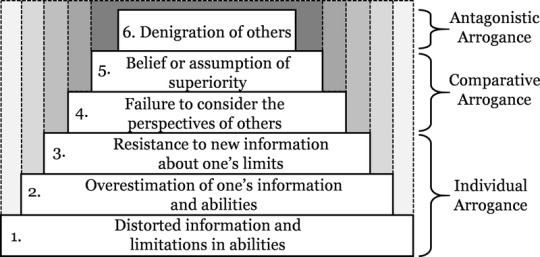
Individual arrogance: an inflated opinion of one’s abilities, traits, or accomplishments compared to objective truths; Comparative arrogance: an inflated ranking of one’s abilities, traits, or accomplishments compared to other people Antagonistic arrogance: the denigration or derision of others based on an assumption of superiority. The types and components of arrogance depicted in Figure 1 are meaningful together because some of the concepts seem to implicate others. One cannot be overconfident about one’s knowledge in a domain (second-largest box) without first having some relevant limitation in knowledge about that domain (largest box); if one disparages others unfairly (smallest box), one is likely to fail to take their perspective and, further, one is likely to believe in one’s superiority compared to them (third- and second-smallest boxes, respectively); and so on. Therefore, the position of each component in the figure reflects a close dependency. Yet, it is possible for causation to flow from smaller to larger boxes, as well. For example, if one hates an individual for any reason, one might be motivated to underrate their capabilities or motives.
From this definition we can say that both Thor and Loki have levels of arrogance from the start but while Thor until the point Odin banishes him has checked all the six components in the picture, Loki is at a level two.
Thor with limited knowledge and an overestimation of his power decides to go to Jotunheim. He resists the disagreements about his limits and chances and fails to consider perspectives of his friends, his brother and father and Jotuns. He considers himself and his race superior to others and insults and criticizes Jotuns and his father. Loki on the other hand has overestimated his knowledge, abilities and whether or not everything goes according to his plan.
After his banishment, Thor comes down from the level of his hubris. When he fails to lift Mjolnir and after Loki's visit, he realizes that his rash actions had terrible consequences not just for him but for his family too. He's left alone and powerless. He doesn't see himself superior to these humans anymore. Jane helps him see things from different perspectives and as weak as a human he learns his limits. He knows he doesn't have the power to fight the Destroyer so he tries to do the only thing he can do, apologize to his brother. And when it seems that Thor's dying, he doesn't care about glory or what tales Asgard would say of his bravery. All he thinks about is that Jane is safe and that humility and selflessness restores his power. Loki though, in his desperation for acceptance, has made all the wrong choices.
Just as Thor overestimated his power, his physical strength and fighting skills in his attack to Jotunheim, Loki overestimates his power which is his intelligence and planning skills.
Loki in his arrogance thinks he can stage and ruin a heist, prevent Thor's rampage, and get rid of Laufey and Jotunheim through his usual method of solo strategies. He learns consequences when his plans inevitably stumble into variables he hadn't accounted for–the guard taking too much time in warning Odin, learning he's a rejected Jotun prince, being actually made regent, the Warriors Three and Sif and Heimdall betraying him. It's not the fact that he grew up learning underhandedness was his most effective method, it's that in the MCU he applied it presumably for the first time to real big events and had to deal with the consequences.
Loki lacks foresight. Like he lacks seeing all of the possible outcomes of his own schemes. That's how he ends up in a lot of messes in the first Thor film. So yeah - he definitely doesn't fully think things through as much as he'd like to believe himself to. Tbf he's not psychic. But it's more of an over reliance on his schemes working perfectly. That he doesn't consider all of the possible ways that those schemes can go south real fast (and end up doing so). So to me...it's less of it being arrogance of his own intellect and more like his over reliance on the schemes themselves. As well as an overestimation of his own control over the situation. Which *could* be considered arrogance... tho I don't think the film really displays it as such. Or it's just not very *clear* in displaying it as arrogance - like aside from occasionally calling Thor an oaf basically(which tbf he's kinda right with that assessment). And like - considering humans and Jotuns as weak and inferior at best - and monstrous at worst(which is less of a character vice and more of a symptom of Asgard's imperialism).
According to the definition of arrogance, what Artemis describes is in fact a complete list of all the reasons why Loki is arrogant. I also like to add that even the imperialism that causes Asgardians to be biased toward other races is rooted in political arrogance and their sense of superiority(Although we can argue that Loki up until his conversation with Odin, did not believe the Asgardian propaganda as he asked why the truth was hidden from him. It was only after he thought his parents see Jotuns a monsters that he tried to radically separate himself from his race).
Like many aspects in this movie, these brothers are once again a yin and yang to each other. Thor's brawn against Loki's brain. Thor's strength represents Odin's warrior side and he is praised for it. While Loki's wit represents Odin's cleverness but unlike Thor, Loki isn't appreciated for a trait in which he is similar to his father and that's sth he wants to change.
Loki has a good plan, but he fails to consider how his action seem shady to those who didn't like and suspected him. And how that can motivate them to betray him. Everything would have gone according to his plan otherwise. He had managed to trick and kill Laufey, he unleashed Bifrost on those race of "monsters" and he had bested Thor in the battle of brain vs brawn. He was pinned but he thought he had won. He was at the top of arrogance level in his grief and madness.
"Look at you, the mighty Thor, with all your strength, and what good does it to you now, huh?"
He didn't consider that Thor, hot headed Thor who looked down on other races and tried to solve everything by throwing a hammer at it, would try to think his way out of this situation to save the people he previously hated.
In my eyes, Odin's banishment, Jane's and Selvig's and Darcy's companionships are only the stakes that make him walk in the shoes of the other side of the violence, but the real wake up call is seeing Loki behaving and talking as Thor used to.
Thor 1 is the origin story of both Thor and Loki, young princes who discover they were still untested, and Avengers 2012 shows the progression of their arcs after their vice has been exploited with one differing element: a support net being present or absent. Thor always had a support net, Loki never did, and their intertwined story shows exactly how in real life people go down their respective paths.
So if Loki's vice is arrogance why he doesn't behave like Thor or Tony?
Bc tbh I probably wouldn't have even thought of arrogance as a vice for Loki. Like my initial reaction was ''wait no that's Thor". But when phrased like the above... it makes a lot of sense. Like tbh I don't know if I'd call it arrogance in his own intelligence - while he's certainly clever he never seems to overbearing about it. Not in the way similarly clever + arrogant characters like Tony Stark display it anyways. Loki never really... seems particularly arrogant?? Like I wouldn't call him humble either but... arrogance just seems a bit exaggerated tbh. I'd say he definitely has pride... tho I'm not sure I'd call it a vice. Bc let's consider other characters that are clearly written to display arrogance at various levels. Like. Anakin is arrogant. Tony Stark is arrogant. Theon Greyjoy was arrogant. And then there's Thor. And like I know there are probably levels to this and it could be argued that Loki's on the less extreme side...But for a character to be arrogant there's almost always like an indicator to that arrogance in said character's personality? Like something about the way they carry themselves... something in the way they display their genuine belief that they're The Best. I don't really see that with Loki. Again I wouldn't call him humble... but he doesn't have *that* attitude I guess. Compared to Anakin ''I would even stop ppl from dying!'' Skywalker. Or Thor 'throws violent tantrum after dad said no to war w/ Jotunheim' Odinson. Or like... half the shit that comes out of Tony Stark's mouth. XD
Yes Loki doesn't have that attitude. That's because individual differences in unawareness of intellectual limits and personality traits affect how the components of arrogance show themselves in people.
We can illustrate potential relations between personality variables and Components 2 (unawareness of knowledge limitations), 4 (failure to consider the perspectives of others), and 5 (a feeling of superiority). Related to Component 2, Schaefer, Williams, Goodie, and Campbell (2004) examined how the Big Five can predict overconfidence in one’s performance. Only the trait of extraversion correlated with overconfidence (the difference between accuracy and confidence). The extraversion factor may be most related to the aspect of arrogance involving inflated self-appraisal relative to objective reality (Lee & Ashton, 2018). There also have been occasional findings of relations between overconfidence and other Big Five traits like openness to experience and agreeableness
Thor and Tony are both extroverts, so their arrogance or at least the part that involves inflated self-appraisal shows itself through overconfident extrovert behavior. That doesn't mean that Loki doesn't act overconfident. It just shows itself in more subtle ways, like the way he stares at his opponent and in his knowing grin. He's less like boastful I'm-the-best-and-I'm-going-to-beat-you, and more like silent I'm-so-smart-and-you've-fallen-for-my-plan.
Even in Avengers when Loki acts arrogantly more than any other time, his real arrogance is not in the way he presents himself to humans in Stuttgart. That was just theatrics. His arrogance is in the way he grins every time his plans work. In Avengers Loki is in his most arrogant state because he's being influenced by the scepter. The same scepter that can bring the worst of every person in its vicinity which almost made Tony and Steve fight, and even Thor reverted back to his old self calling humans petty and tiny. I also like to mention that it was Tony who understood Loki the most and one of the reasons was because he saw the same arrogance of himself in Loki.
Avengers 2012, Dark World and the stories that followed should have picked up the threads left from the first movie and continued the progression of the vice (flaws+virtues+background) Vs consequences. Some of them did. Some of them did not.
Tldr: both Thor's and Loki's vices were arrogance built in different ways and their arcs showcased how society's (=worldbuilding) support influences the consequences of the same vice until the franchise was rebooted (=different worldbuilding and vices)
Source: Foundations of Arrogance: A Broad Survey and Framework for Research
Next: Loki
51 notes
·
View notes
Text
was gonna add this in the tags of a post but it got really long and i was like ok lemme just make a separate post to be pretentious on. but i think the urge to separate character action from cc action in mcyt fanwork is the kneejerk reaction to "what if this is rpf"... its a taboo to talk about rpf or write rpf (in general but especially in mcyt fan space) so we in fandom tend to be very stringent about, like, fuck, i dunno. the platonic ideal of OOC vs IC. im not going to make broad claims about the historic relationship of mcyt fanwork to rpf because well its really late at night and thats the sort of conjecture reserved for annoying my friends in dms. but it seems apparent to me that the birth of even the terms c! and cc! were due to wanting to distinguish ethical fanwork from non-ethical fanwork.
theres a few layers and axises to consider the ethicality of fanwork (of which i will consider fanfic in this post because i am foremost a fanfic writer). a good example to start, when we discard the c! vs cc! labels, and start to look objectively at work, is the level at which a fanwork becomes unethical. we look at the surroundings of the fic --
are they in minecraft? does the work make reference to them doing minecraft things? how is, say, movement or inventory or block shape and placement described how realistic is the minecraft world when compared to our real world? does it seem like a general fantasy setting?
is it acceptable to put the subjects into a fantasy setting? a high sci fi setting? a superhero au? what about an au which elaborates on existing political structures alluded to in canon?
what about a modern au, no powers? does, for example, the description of mumbo having a mustache or tango having hair suffice as distinction enough? what about modern aus where they live in real life cities? what about historic aus? is 1800s london more acceptable than 2020s london?
what about names? generally it is agreed that grian should not be called charles in a fic for it to be considered referring to the character, and not the CC. is that distinction meaningful when we are interacting with the simulacra of grian? what about jimmy? is it enough of a distinction to call him jimmy solidarity? what about calling philza phil? is that acceptable?
what should be considered canon to that setting? does "off camera" count as in character? (this is where i think the lines start to blur a bit for people) what if characteristics that are exclusive to the "real person" are given to the subject of fiction (ie. scar's wheelchair or other aids) (this is the point where i'm lamenting the lack of ability to add footnotes to a tumblr post)
what is the breaking point for all of these ethical considerations? this is something that must be present when considering fanwork from the model of c/cc divide. if one were to question the necessity of the existence of that divide, what changes (negative or positive) does that bring to the community? in art, fic, meta, crit, etc.? do we value the artist's opinion, their intent, over the art itself? i said i wasnt gonna bring up barthes in a tumblr post but the invention of the author as supreme truth maker can only hurt the growth of art. i think that's double edged here. the artist both has the autonomy to decide what is ethical to create but the audience also has the freedom to decide what is ethical in.... fandom. i just had to stop myself writing society, and write fandom. but yeah. food for thought. i dont really have a good way to end this uh heres a picture of my cats
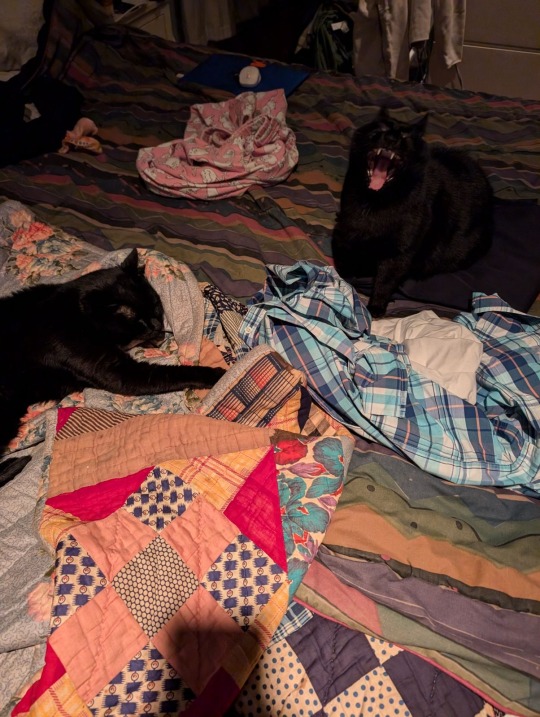
#this is like 10% of what my ethics in fiction paper is about but whatever#with the philosophers names filed off for tumblr#wizard scrolls
9 notes
·
View notes
Text
Have you already played Curse of Strahd? Have you played it multiple times? Are you, dare I say it, bored of Curse of Strahd?
Well, have I got a horrible idea for you.
Curse of Strahd NG+.
Before you start, you give you players (4-5) a copy of the Curse of Strahd module. They have unfettered access to meta knowledge in the module that they can use in game. The player characters also get an inspired feature. They choose one feature of any level for their started class, including a spell of any level, and they can use that feature at the cost of an inspiration (optional: this also incurs a point of exhaustion or perhaps more, depending feature level vs character level). The player's goal: Kill Strahd.
However, the GM doesn't just roll over and let the players power game on easy mode. The GM, along with one or two other Co-GMs have a secondary objective. The GM squad also gets a small party of NPCs with a goal of killing Strahd, but they level harder than the players and if the players pass over a piece of the adventure in favor of pursuing something they normally wouldn't know about the GMNPCs can take advantage of this to change the game by killing off module important NPCs, capturing important items, and making allies and so on.
The game starts out normal, but the more that the players power game, the more the base game changes. Because the GM squad also gets to use meta knowledge. The end game is the GM squad fighting the players while the players confront Strahd (who quickly becomes perturbed by these incredibly powerful people who seem to be fighting over the honor of killing him).
56 notes
·
View notes
Text
Who has control when? Undertale/ Deltarune meta
Undertale and Deltarune play around with the relationship between the Player and the Player Character (PC). There's Kris, who has their own personality and can disapprove of actions the Player forces them to do, and in Undertale there's 3 people attached to the PC who could be in control at any one time.
So here are my thoughts trying to parse out clearly who has control when.
The Player
The Player. What are their motivations? What have they done? Are they evil? These are nonsense questions because the player is not a character, the player is a role.
The player is me; the player is you; the player is everyone who has ever played these games. When you boot up Undertale or Deltarune, you take on the role of the player. Is the player evil? I don't know, are you? We cannot talk about the player in theories or metas without acknowledging that the player is us.
(Which is why it's confusing and irksome when I see analyses that treat "the player" as if they are a character who definitely did certain things.)
So when playing Undertale or Deltarune, what do you have control over? On desktop, you can use the arrow keys on your keyboard to make the player character move, move the red soul in battle, and navigate menus. You can press C to open the menu, X to exit the menu (and in Deltarune you can hold X to walk faster), and press Z to select options and interact with objects.
You can save the game, reload a save, reset, close the game, and open the game.
You may be thinking those are just the controls, and yes, they are. I mean, what else did you expect? The choices we make while playing are on us.
There are times when we do not have control. For example, we don't have control in cutscenes. We don't have control of Susie during sections when we're focusing on her (tho we do have dialogue options and choices that do nothing).
Then there's the ending of Deltarune chapter 1, where the red soul is separated from Kris's body. If you try to move around, you'll see that the red soul does move, suggesting that our control of the player character is dependent on the red soul inside them.
Frisk/Kris
And now the player character, the PC, the player avatar. I feel these two have a similar level of control over their own bodies when you're involved.
(As a note, when I refer to "the player character" I'm referring to what Frisk/Kris's body does, not what they choose to make it do.)
They have control during cutscenes and have control when the red soul is separated from their body like at the end of the Deltarune chapters. (No, I'm not entertaining theories about Kris is being controlled by someone else when they're in shambling zombie mode.)
They also control how they interact with things. You can press Z to make them interact with things, but they have discretion over how that command is interpreted. (See: Kris refusing to look in the Asriel room in Queen's castle.)
Both are "silent" protagonists. Their speech is limited to dialogue options chosen by us, and we are not privy to anything else they say. If they say something we didn't tell them to say, we have to infer from the dialogue of others. (For example, Frisk telling Asriel that their name is Frisk.)
However, there's a key difference between Frisk and Kris.
Frisk doesn't show a lot of personality, and what personality they show depends a lot of what you do. They basically turn into the person that matches your choices, the person we mold them into. (See: how the narration of interacting with Mad Dummy before the fight changes depending on your LOVE)
(That narration is actually quite interesting. Not only does the narration about Frisk's thoughts change, "You feel bad [for tapping the dummy]" at LV 1 vs "[punch the dummy] Feels good" at LV8 or more, but also the actions. How the player character interacts with objects depends on LOVE, number of people killed, and the route.)
We know that Chara climbed the mountain, and it wasn't for a happy reason. In fact, it's very likely they were planning on committing suicide. Frisk and all the other children who fall into the underground are likely from the same settlement.
I wouldn't be surprised if Frisk was also planning on dying there.
If you heckle Snowdrake, there's a chance you'll get this line:
You tell the Snowdrake that no one will ever love them the way they are... | They struggle to make a retort, and slink away utterly crushed
Oof. Frisk is probably like, 10? I'm concerned where they got this from. Remember, at the end of pacifist, your options are to either travel the world as an ambassador or stay with Toriel. Going back to Frisk's human parents isn't presented as an option.
So they probably didn't have a good home life, and now they're relying on you to get them through the underground and to the end. Whether you force them to kill in order to do that will affect their attitude on killing and whether killing monsters is okay.
In short, Frisk is a very small, impressionable child who is what we make them.
Meanwhile, Kris has a very concrete personality and history, and while it doesn't show on their spite, it's clear from their facial expression, tone of voice, and the narration when you make them do something they don't approve of. (See: Basically most of the normal route dialogue choices in chapter 2 and how Susie reacts to Kris's tone of voice.)
They're not impressionable like Frisk was, and are just tolerating our possession of their body in the game. They have stronger opinions on what we should and shouldn't be making them do.
Still, neither is keen to scream at the top of their lungs that they've been possessed.
Chara
Go read A CHARActer Analysis first and then come back.
Unfortunately, the user that made that post was deactivated so here's a link to a reblog that has all the raw text and here's a link to a google drive with the original post screenshotted by @thepilotdogee
Yes, I know it's long but it's also the best analysis of Chara's character that I know of.
Now, I like the Chara as narrator theory, and considering that they tell us they woke up near the beginning and looked to us for guidance, it explains the narrator's attitude in pacifist vs genocide runs very well. I also generally agree with the conclusions made by this analysis.
However, there are a few sticking points.
For one, I think who's doing what when we as players don't have control in cutscenes is more ambiguous. Are the actions performed by the player character in genocide that we associate with Chara done by Chara or by Frisk?
Chara still mostly uses "you" to narrate what Frisk does when you have them interact with something in genocide, so Frisk still has control over how they interpret your commands. Did Frisk kill Flowey and Asgore at the end of genocide or did Chara? We have two characters who aren't us that could potentially have control during cutscenes, and the actions of one are always relayed to us by the other.
My personal belief is that Chara had basically zero control beyond narration and the UI elements. Chara isn't aware that Frisk is not us in genocide (possibly even in pacifist) because Frisk's attitude and thoughts always align with our choices.
(In the CHARActer analysis, it is explained how your actions as the player tell Chara and Asriel whether it was okay for Asriel to refuse to kill the humans when they died, and by being a pacifist you are showing them that choosing not to kill was better. Meanwhile, Frisk is relying on you to survive, and goes along with whatever you seem to think is correct. Both could've taken the initiative to do the last kills of genocide because both consider you their guide.)
...Then if you do genocide, you have to give Chara control of Frisk's soul to reset the world.
This means that at the end of a true pacifist, instead of Frisk getting the reins back to their soul, they now belong to Chara. Chara, who wants to force us to experience consequences for our actions, does the only thing they can do to affect us, which is to ruin the ending.
#undertale#deltarune#undertale theory#deltarune theory#undertale meta#deltarune meta#the player#undertale player#deltarune player#kris deltarune#kris dreemurr#chara undertale#chara dreemurr#frisk undertale
89 notes
·
View notes
Text
Type of Guy Who Fears The Void
On the object level, I think this DeBoer piece correctly identifies a certain type of person (aging white man who self-consciously and showily hates all aging-white-guy pop culture in favor of trying to stay hip), but as the commenters implicitly/explicitly point out, that type of guy is concentrated among the east-coast-grad-educated-tastemaker-social-media-part-time-writer set, i.e. Freddie's milieu, which he often tricks himself into believing is the only milieu in the world. Go to any bar in the Midwest and poll the natives on BTS-vs-Pearl Jam and you'll get different results. (Freddie is of course interminably contrarian relative to whatever his local milieu is, and if fate had brought him to Kansas instead of Brooklyn, he'd be the most red-tribe-hating, pining-for-Brooklyn's-loving-embrace guy on the internet.)
But the meta level of "People recognize that the world naturally puts them in stereotypical boxes and either fight to escape that or wholeheartedly embrace it" is something I think about a lot. That first paragraph was all about different Types of Guy, and that's all it is these days, isn't it? Type of guy, type of guy, type of guy. A whole generation of internet-raised autists can pinpoint your political beliefs based on how you dress or what kind of car you drive. "Guy who makes youtube videos while driving his SUV and wearing wraparound sunglasses" is a different type of guy than "Guy who insists that Carly Rae Jepsen is the best songwriter of the 2010s" but they are politically and culturally opposite Types of Guy, even though there's no rule that says Democrats can't drive SUVs or Republicans can't like Carly Rae Jepsen. But the trend-lines are strong enough that people notice anyway.
@max1461 occasionally gripes about how quickly and thoughtlessly people transpose is-statements with ought-statements, or in other words, take objective factual data about something and try to force it into a prefab narrative. And it certainly is annoying, but to an extent it's like making fun of cavemen for thinking every rustle of grass is a tiger. That's what their environment is giving them, and it's what their brains adapt for. What our environment is giving us is an endless parade of people who eagerly and effusively promote their political and cultural opinions, and eagerly and effusively identify those opinions with such and such group, so no wonder it's so easy for even an amateur to unearth a Type of Guy. No wonder you can look at someone with a Roman-statue avatar and predict with reasonable accuracy his thoughts on young women who dye their hair. And I think this is something the internet makes worse, not better.
I think any objective accounting of the situation would have to conclude that it's easier to be an eccentric in 2023 than in 1993. The internet has allowed weird people to find each other, talk to each other, understand each other and themselves in a way that simply didn't exist before. At the very least, you don't get that "Am I the only human on earth who's like this?" feeling. And the cheap, Hallmark version of diversity/eccentricity is still a popular cultural value: those wall-hangings and birthday cards your aunt buys say "Be Yourself: Everyone Else is Taken", not "Yourself sucks, Be Someone Else." No one wants to be seen as the stodgy, bitter old fart. Part of it, I'm sure, is a cultural thing--Americans seem to obsess over individuality and being one's truest self more than others.
And yet...there's also this ambient sense that eccentricity-in-itself has been devalued in 2023 relative to 1993, at least in my circles. Everything from eccentric tastes in art ("What are you, some kind of hipster filmbro?"), sex ("Of course I'm sex-positive but weird creepy shit doesn't count!") or politics ("You don't really think that, you're just being edgy.") People who value weirdness and eccentricity for its own sake feel hemmed in by people who either openly see it as a threat to their own culture's local hegemony. A lot of the internet really does seem to live by the 'nail that sticks out gets hammered down' and sees that as a good thing. Seems paradoxical.
(For the record, I'm not laying the blame here at any particular subculture. Conservatives blather on about freedom and liberty and then say anyone who refuses to lick an HOA's balls is a dangerous subversive. Progressives say everyone is valid and beautiful and then plaster their spaces with various 'freaks DNI' equivalents, 'freak' status being determined by vibe-centric whisper campaigns. Liberals will Celebrate Diversity up to and no further than the point where it damages quarterly profits. No "name" group is immune to this, really, but certain subgroups are.)
A theory: the normie-weirdo ratio isn't particularly different than it used to be, but the way they interact is different. In the pre-internet days, the weirdos were well aware they were weird, and in having to navigate normie-land with psychological armor on, at least they might come to understand it somewhat. Now, for those who want it, there's an unending stream of validation and insistence that you're perfect the way you are. Without shading into the "can suffering be a good thing if it leads to change for the better?" argument, I think even people who are all-in on the answer being "no" have met at least one person defined by their self-actualization curdling into selfishness and narcissism, to the point where you can't understand how they function, in a way that is directly attributable to a having a stable of pseudonymous online enablers. That's a real phenomenon the way that "Shut up and repress, you freak" is a real phenomenon. They can both suck. They can even both suck in ways that make the other one worse.
The post-mainstream, pre-social-media 'Golden Age' of the internet was when it was basically a playground for weird people. Now everyone's on it by necessity, the weirdo-in-a-small-town dynamics are back, but now the whole world is the small town with the added "no one can ever really escape for good" dynamics of the internet tracking and recording and monetizing every aspect of human interaction.
The weirdos who are old enough to remember when the internet was their turf close ranks and start watching each other for the first signs of Turning Normie--itself something that's antithetical to actually following one's own star and drawing from whatever cultural tradition you find satisfying. The weirdos who aren't old enough grin and bear it because "you're constantly being judged by everyone" is just normal life for them. The stuff that's so popular that liking it puts you in the biggest box possible will benefit; stuff that was never gonna be popular under any circumstances will keep trucking. It's the cultural middle class, as usual, that suffers the most. Again, as I keep emphasizing, this cultural panopticon being both unending and global is unprecedented in human history.
I really think a lot of current cultural neuroses are due to this, although I can't really prove it and don't have the resources to research it. This sense of modern technology revealing to people how fundamentally uninteresting they are and rebelling against it explains a lot to me--the tendency of people to ideologically self-sort to narrower and narrower levels, the uncanny ability of observers to categorize even the relatively-novel versions of those self-sorts, the tendency of some people to just give up and openly embrace everything the hivemind says about them, "be yourself" as a zombified and omnipresent cultural meme when millions of people are struggling existentially with exactly that, every culture absorbing ambient victim-mentality and thinking they're the only right-living people in a world gone mad, the 'cultural class' getting deeper and deeper into objectively-adolescent pop-cultural obsessions and lashing out at the idea they should try something more challenging, the aging-out-of-relevance hipsters Freddie discusses being mortified by the idea of being perceived as exactly that.
The problem, for me at least, is that I understand there is a way out, and if anything it feels worse. I may be a bit younger than the type-case Freddie describes, and am not in an industry where I have to constantly prove my relevance to myself and others, but I am doing the opposite of aging gracefully. Instead of constantly trying to convince my social circle (I don't have a social circle) that having the political, cultural, and artistic preferences of a 21-year-old means I still am one at heart, I engage in the much-healthier practice of spending every waking moment fantasizing being 21 or 18 or, shit, even 14 again. I know nobody really likes getting older. I also think that if everyone was as obsessive and self-loathing about it as I am, society would cease to function. My regrets and pining are definitely unhealthy, obsessive and all-consuming, but I don't really talk about them because there's no way it ends other than "Yeah, that sucks."
But a lot of the people in Freddie's comment section are saying things like "Once I realized I was fundamentally unimportant and my opinions didn't really matter, I could get down to raising my kids/doing my job, which matters more than my feelings." And maybe ten years from now I'll be OK with that. Hell, maybe I'll actually have kids, unlikely as that sounds now. Right now that mindset sounds like a self-administered lobotomy. Maybe I'd be OK with it if I'd actually lived it up in my teens and twenties, tried to become an actual person and discovered what I like about myself, instead of just vaguely Following Rules and assuming there was a payoff to that. Maybe I'd accept that there comes a point in life where my destiny is to be a good parent/worker and that necessarily implies shaving off the hard bits of your personality. Or maybe even the people who were good at being young struggle with getting old. Maybe our cultural/technological moment is just making that a struggle for everyone. Guess I'll never know.
But as we creep closer to no one's parents, then no one's grandparents, remembering a world without the eternal and all-consuming Now of the internet, I suspect I won't be the only one aging with a complete lack of grace, and I suspect we as a culture are completely unprepared to deal with it.
28 notes
·
View notes
Text
Having just cleared Dragon's Dogma, there's this meta level to the story that I find really fascinating. From the start, you have the Pawns - with their stock personalities, repetitive behavior, and lack of any desire or ambition save faithfully serving the Arisen, they're as is if video game NPCs, or what how we think of most NPCs like, actually existed in the game world. They're more like "NPCs" than any other NPCs, the other human characters in the world.
(the rest of this post concerns spoilers for the latter part of the game)
The Seneschal sort of acknowledges this when he compares the people of the world as being little different from Pawns, again in their repetitiveness and static-ness. He doesn't fully break the fourth wall - he is not aware that the world is a video game - but he leans on it pretty heavily when he talks about the state of the world. It is a perpetual cycle that never changes until acted upon by a person of strong will - an Arisen, in other words a player character.
The player character might not be someone powerful and important whom the story revolves around, in every single game, but in most every game things do not change without some intervention of the player, whether that's through major decisions or simple triggers like the passage of in-game time affecting other things.
I believe that through their use of choices or lack thereof, video games can make better mediums for stories with themes of free will vs fate than any other medium with a non-interactive story. Similarly it seems a natural connection to make games with existential themes, to connect the question of "why play this game?" to "why live life?" (because you care about the world and it's people, because you feel you have an obligation to see the story through to the end, because it's fun and you simply want to), or the cycle of dying + respawning + new game plus to real life religious and philosophical ideas like reincarnation or eternal recurrence.
(Aside here - NieR: Automata approached the same analogy by asking players to delete their saved data in order to get the best ending of the game. Breaking the cycle of conflict in the game story and breaking the cycle of replaying the game with the same action, which is symbolic of escaping the cycle of samsara.)
The final quest of Dragon's Dogma, to continue watching over the world as the new Seneschal, can never be crossed off your quest list because, as part of this endless cycle, the objective can never truly be completed. (I guess maybe you could use the Godsbane Blade on yourself, I haven't tried that,) else make a new save with a new Arisen to replace your old one - thus continuing the cycle once more.
Back to that fate vs free will point, that's also one of the biggest themes of Dragon's Dogma of course: the plot of the game is the traditional Chosen One fantasy trope, but the game hammers it in harder than a Mystic Knight's mace swings that your choices are important. There are times in the story when things are bigger than you or outside of your control, like being drawn into the politicking in the Duke's court when you're just here to slay the dragon, but it was your choice to stand up to the dragon that set all of this in motion. As you reach the endgame you are offered choices to give up and turn back if you don't want to face your destiny - namely Grigori's deal of sacrificing your beloved in exchange for immortality and worldly power, and the Seneschal's offer of a peaceful death and dream of peace, When you don't choose those options and instead press on, it makes the choice you do make even more powerful. It's a tragic thing for a Chosen One to never have the chance to escape fate, and another, more beautiful, heroic, thing for them to be given that chance but still choose their fate.
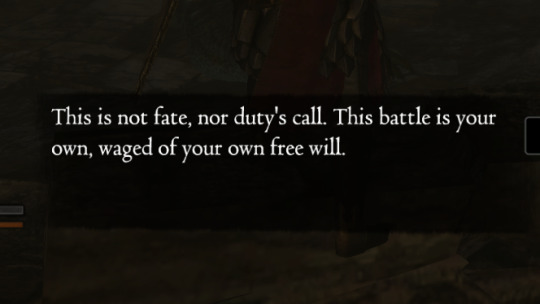
#dragon's dogma#dragon's dogma dark arisen#DDDA#dragon's dogma spoilers#meta posting on my art blog#I get all of my knowledge of philosophy from wiki-ing concepts I hear about from video games
8 notes
·
View notes
Text
Royal Pain: Meta
Just something I'd been seeing in the comments and tags of the story that I wanted to clear up but kept forgetting to do when I posted a new chapter.
Billy vs Seth.
Now, when I went through to grab the descriptions of Seth, I realized I made an error. His eyes get described as blue the first time, and hazel when he threatens Steve. So when I post in on AO3, his eyes will be hazel to avoid the confusion.
Billy is in here, by the way. It's just a blink and you miss him moment in part 9.
“Is this really a tattoo parlor, man?” one of the applicants asked. He was what Steve would have stereotyped a California surfer boy. Bleach blond hair that fell to his shoulders, tanned skin, dark blue eyes that were currently glaring at Steve.
Steve let his shoulders roll back as he regarded the man in question. “What? The bright, colorful design precludes it from being a place people come to get tattoos, how?”
The guy leveled another glare at Steve and then leapt to his feet. “Whatever, this blows. I’m out of here.” He stormed out, pushing the door so hard it clanged against the wall harshly.
This is Billy. He came to apply for the apprenticeship because Max talked highly of Steve as tattoo artist, but didn't like the aesthetic and violently left the building.
Seth Davies as described in the story
From part 14
Eddie didn’t have a lot of exes but Seth was the worst and unfortunately the last. He was everything Eddie thought he wanted in a partner. Long blond hair, tattoos, piercings, long legs in tight leather. He was charming and funny. He started off a little clingy, and ended up full on possessive. He became jealous of the band. Of Mandy, even though Seth knew Eddie was gay.
From part 16
At the bar a blond man with legs for days and a cocky grin leaned against the edge of the bartop with his elbows. Ink peaked out of the black tank top he was wearing and he had piercings in both ears and a snakebite piercing on his lower lip. He lowered his sunglasses as he watched Eddie and Steve on the dance floor. His bright blue eyes glittered with malice, the grin never leaving his face.
You'll notice the blue eyes here, but they are described differently than Billy's, bright over dark. Dacre Montgomery (Billy) has dark blue eyes, this person has bright blue eyes. But I will change it hazel to match the next description.
From part 18
Steve felt someone shove him into the car door. He was whirled around and his back was slammed back into the door. He was face to face with his assailant. He was objectively handsome, Steve supposed. He had long, straight blond hair that went down to the middle of his back, piercing hazel eyes, and piercings in his eyebrow, nose, both ears and pair of snakebites in his lower lips.
You'll notice how this description matches up to Eddie's in part 14, hinting who the culprit is.
So I hope that clears it up. Seth is not Billy and Billy has already made his mark on the story.
27 notes
·
View notes
Text
T*LC Refutation (but decidedly NOT Johnlock refutation, because that definitely was a thing.)
Part- 1: Introduction.
[Note: I love and ship johnlock because I saw it for myself in the show when I watched it and was part of the general audience in the past. I even want it to become canon in some Holmes adaption in the future. But T*lc needs to get sucked into obscurity and forgotten. Other fandoms like Good Omens, etc., are following the same rhetoric in their "meta" posts, and that needs to go. This is crucial for our basic critical thinking skills and objectivity.]
Alright, folks. Let's talk about the logical fallacies, and how most of the t*lc metas are flawed to their core.
Not to beat the dead horse here, but I entered the fandom in late 2021 (after having watched BBC Sherlock a year ago). I'd started to ship Johnlock as soon as I entered the fandom (because that's what I saw on the show independently, as part of the general audience in the past, even though it was on a subconscious level at first).
I discovered T*LC in December, watched and read metas about it, became a T*LCer myself (albeit briefly - for like a month or two), and then I grew out of it.
I grew out of T*LC because while the meta posts were seemingly clever, I always thought there was something off with most of them. I didn't have much vocabulary related to critical thinking skills back then (because English is not my first language), so I couldn't put my finger on exactly what was wrong with them.
I reluctantly and falsely assumed they must be right just because I couldn't come up with effective counter-arguments then (what a flawed way of thinking). I just thought that this thing (t*lc) was not my cup of tea (ha!).
I continued to ship Johnlock though. I still do it wholeheartedly. I'm no longer part of the BBC Sherlock fandom, but I do still ship Holmes/Watson enthusiastically in various other Sherlock Holmes adaptations.
In the meantime (i.e., from when I dropped the idea of t*lc like a hot potato to the day I decided to exit this fandom for good), I did a lot of research.
Research related to what the fandom used to be like throughout different eras when the show was still on air (through sources such as old posts on Tumblr/other social media platforms, Sarah Z and hbomberguy's videos on t*lc and the actual show criticism respectively), and also research about how the rhetoric of most conspiracy theorists looks and sounds. I've read about articles on science vs pseudo-science as well (I come from a science background myself, so those articles were helpful as a refresher for me).
I also read a lot about cult psychology and how it can be used effectively to lure anyone in.
T*lc checks all the boxes of flawed ways of thinking, various logical fallacies used to prove or disprove something, pseudoscience, a typical conspiracy theorist's rhetoric, and a cult group's way of thinking in real life.
When I use these terms, I do not throw them around lightly. I've read a lot about this along with my friend, let's call them Kim. For context, Kim also comes from a science background. They ship johnlock too.
I know the comparison of T*lc with a religious cult in real life has been done to death, and same is the case with the comparison of t*lc with any other outlandish conspiracy theory out there. It's just that I've been bottling up my thoughts and feelings on this thing for way too long. I can't do that anymore. Just bear with me if you find something repetitive.
Kim and I read about all these things on the internet, had a lot of long discussions for months altogether, and now I've personally decided to share our conclusions with anyone out there who stumbles upon this post.
This blog is a few days old, and I'm the only person behind this, so I don't have many followers just yet. I'm not even expecting anything from anyone. If you see this post, I just want you to read it with an open mind and act according to your judgement afterwards.
Now that we have the whole context with us, let's begin.
Part- 2 : What's wrong with their actual meta posts?
T*LC (but NOT Johnlock as a whole) refutation master post.
#anti tjlc#anti mofftiss#anti moffat#anti bbc sherlock#t*lc critical#introduction#a brief context#sherlock holmes#we care about science and sherlock holmes in general#fandom meta
8 notes
·
View notes
Note
anon from this ask: https://www.tumblr.com/ca-suffit/757613676896337920/im-sorry-your-takes-are-generally-pretty-great-and?source=share
first thanks for hearing me out and your thoughtful response. had to think about it a bit and analyze some of my own biases. i think i have a certain amount of trust in the show around what I expect they're going to do with lestat in terms of examining the privilege he has (a white abuser in the spotlight telling his story would be a great topic to unpack, especially via daniel), but i know that's fully based on nothing! it would just be such a waste if they didn't. so I am putting more expectations on an objectively minor glimpse of information so I'll pare that back in my reply.
the one thing i wanted to clarify and emphasize was the 'groundbreaking'-ness of whatever lestat is doing here. i am not really arguing that he appears to be doing something cutting edge or never been done before, and i don't think he needs to be. (practically speaking, we're talking about art within an art aka a tv show, the art of a fictional character, there are limits.) given the large list of influences, they appear to be leaning into recognizable fashion and sound, but just because it's pastiche doesn't make it, like, uninteresting as a queer performance. on a more meta level, it's really fucking cool to see them leaning into glam rock and queer influences after the heterosexualization of Queen of the Damned, and letting a lead queer character be trashy and messy and also polarizing - not everyone is going to LIKE his music.
and yes it will speak to the individual. not every queer person will find this interesting. i guess what i wanted to defend was the elements of queer fandom who feel seen or moved by what they've decided to do here and i hate to see that get dismissed as memes alone or like no real queer person would find this good/worthy, as some of the other asks have implied, or that it's ONLY a symptom of white fandom. but i get that your blog in particular makes a space for fandom critique and there certainly is a lot of critique, and a lot of uncritical ~slay queen~ type response. i wanted to offer an alternative perspective, i guess. (and when I think of lestat making himself into a "queer icon", i personally don't mean a champion of activism or a beacon of positive representation. he's a horror character at the same time and has done terrible things. this is why I like the show, though.)
lastly, your point about the other characters and their art connections: absolutely!!! the fact that EVERY character here has an art connection for me makes this tv show a queer text in general. I want to add these art connections are complicated. lestat is as much a monster about music as it gives him humanity. louis's struggle with photography feels like a coda about his former struggles about his homosexuality. claudia giving up on her passion for the stage through armand's abuse is heartbreaking.
emphasizing lestat as the only artist would be a mistake. I think what sets him apart for me is that his art and also his queerness vs, say, louis and his art and queerness, is more of a divide between public vs private. louis did make an attempt to enter a public space and was shut down/discouraged. lestat reaching an in-fiction iconic status is a matter of privilege (as well as his personality, lol). i don't really have an argument here, just responding and hopefully adding to the discourse.
hi and thank u for coming back!!
despite what some ppl want my reputation to be, I do actually like talking about things and giving space for multiple perspectives. it helps nothing to take sides and be at war with each other all the time. a lot of why this fandom has gotten worse is bcuz ppl are doing exactly that. u can like whatever u like, but understanding the criticisms of the thing are crucial too. a big issue surrounding lestat is that ppl aren't used to his whiteness (or whiteness in general) being commented on. white fans, especially, will find it rly jarring to be perceived that way and take it rly personally. there's so many ppl here who think I'm calling them racist just bcuz I'm talking about lestat and prbly his white ignorance or smthing. they apply it to themselves and feel like a bad person for liking him. then they shut down and block me, even if our conversation was calm. white fragility is a hard thing to overcome.
there's not much u can do to avoid maybe being clumped in with white fandom if u like lestat, but it's not like the reality is that those are the *only* ppl who like him. that lie they perpetuate that everyone else is a lestat hater, loumand shipper or whatver is bullshit. they're overly simplifying a deeper issue bcuz they're racist, manipulative, and stupid. plenty of ppl like lestat and aren't part of that group. but u are gonna have to get used to being judged for liking him in some ways bcuz this fandom *has* made association with him a red flag. it doesn't mean *everyone* is gonna be hostile to u about it tho, but it does mean ur gonna have to change expectations and be a lot more open to hearing criticisms of it all. ppl aren't rly dismissing him outright or saying ur bad for liking him, it's just a fatigue surrounding his character and the fierce protection of whiteness this fandom has built around him (alongside anne's racist history and favoring of him too already). I mean, it seems like ur already aware of this, but just to put it into words too. lestat has always been an interesting, fucked up character and ppl should feel free to identity and explore whatever with him just like any other character.
tbh a lot of his point has been to be a little stupid and cringe anyway. idk how ppl read his narration and take it srsly and believe he's actually hot shit. he should be a disaster idiot rockstar with an ego that doesn't match his actual presentation. I'm hoping they might explore a lot with that. he's having a mental breakdown in every book but doesn't seem aware that he is, so what better way to explore that than with the white rockstar angle. that's p much all of them anyway lol and if ur queer (and a vampire having a neverending existential crisis) then even more so prbly.
#asks#interview with the vampire#amc interview with the vampire#interview with the vampire amc#iwtv amc#amc iwtv#iwtv 2022#lestat de lioncourt#rockstar lestat#fandom racism
3 notes
·
View notes
Text
Yeah, you know. That's one of the ways I believe I am unusually clear headed. I see all the levels and meta-levels as their own things, I don't mush them all together. Equivalently, I don't demand a bunch of coherence conditions between different properties in the object- and meta-levels, you know, coherence conditions that need not be true. This is exemplified by how I don't find hypocrisy bad. Hypocrisy is bad if you demand certain coherence conditions between belief and action and speech and so on. And I don't demand those.
Right, yeah. It's not just object and meta that I don't demand coherence between. I just demand fewer coherence conditions than most people in most domains. It's like how I also say almost everything is orthogonal. Nothing is related to anything else. I live in an epistemic world where things slide past each other freely, they don't catch.
Do you see what I mean? It's a little hard to describe. Kind of like contextualizing vs. decoupling norms, like something that decoupling norms are a special case of.
It's not that all patterns are fake, there are real patterns, and there are real valid logical inferences. But patterns and valid logical inferences are extremely sparse in the space of all propositions. Mostly they just slide past each other. Free object. Freely generated reality. Or almost.
13 notes
·
View notes
Text

Ok @meowstix I know I'm probably not who this was meant for, but I'll do it. Also it's not an essay but but ramblings that I divided into sections. None of these are really worthy of an analysis post on their own so I took the opportunity to put them all here together
Also, I misread the tag and thought it said 3000 word essay. I was approaching 2k words when I saw that. Oops
Kai wanted to destroy his opponent
Kai, at first, wishes to utterly destroy opponents. A character like Reiji embodies this to the extreme, feeling physical pain if his opponent doesn't suffer. Kai's sadism doesn't come from a deep desire to witness others suffering, but rather from a need to feel stronger than his opponents. This peaks with Black Dranzer, which appeals very specifically to Kai's hatred of losses. In this sense, he's closer to Red Eye, who sides with the villain because he can't stand feeling powerless. Unlike certain characters with a "win at all costs" mentality (Barthez), Kai never even considers cheating. This is another similarity to Red Eye, who criticized Violet Eye for battling Wakiya in an unfair battlefield
This distinction between "destroy the opponent to show power" vs "destroy the opponent to make them suffer" is never really brought up in canon, but it clearly exists on a more meta level when looking at antagonists who fall into either category. The first includes Kai, Kyoya, Ryuga, Red Eye, Lui, and Rashad. What do they all have in common? They had times when they weren't villains. As for the second group, it includes Volkov (indirectly), Reiji, and Phi. Villains who fall under the second category don't tend to get redeemed in Beyblade
Kai's relationship with Tyson is the same as his relationship with beyblade itself
As Kai's relationship with Tyson progresses, so does Kai's view on blading. Tyson, especially in season 1, is defined by his outlook on the sport. For him, it's about fun more than anything (in stark contrast to both the Majestics and the Demolition Boys). Their battle in G-Rev was one that Kai thoroughly enjoyed, and is probably the biggest reason people ship these characters (because Kai acts coldly to most people, shippers don't have many choices). The obvious parallel here is Gingka's battle with Kyoya in the World Championship, where their love for the battle and desire to beat the other (without being a hero-villain situation) caused both of them to endanger themselves, get injured, and almost destroy their beys to continue the fight. Kai had no desire to destroy Tyson, he just wanted a good fight
At first, Kai considers Tyson to be naïve and immature due to his views on blading. When he agrees with Tyson's views, he changes his mind about Tyson. But other characters also battle for fun and he doesn't respect them (like Daichi). Why does he respect Tyson so much specifically? Because Tyson was the one to change his mind. Kai has a high opinion of himself, but recognizes when he's outclassed. Thus, if Kai is strong and Tyson is stronger, that means Tyson is very strong (aka being able to lift a heavy object is only as impressive as the object's weight)
Lack of villain loyalty
The number of times in Beyblade when a villain is betrayed by an underling is pretty high. Volkov, Zagart, Barthez, Doji, Ziggurat, Pluto, the Garcias, Ashtem, and Hyde all had underlings turn on them at one point (or more for Volkov and Doji). But what sets Kai's betrayal of Volkov apart?
Volkov was a piece of shit and everyone hated him. Volkov simply ruled with fear. This is similar to Barthez, Doji, and Ziggurat (with Zeo). Kai betrayed Volkov because, in short, he mustered up the courage to do what he always wanted. Kai is closest to the Barthez Battalion in his betrayal. The battle at the lake made Kai realize that a blader's strength comes from more than just the bey, and that gave him the confidence to stand up to Volkov
Kai was, for the most part before the Russia arc, on the protagonists' side. He had his own agenda, but his goals aligned with everyone else's enough that it was in his interest to team up. And he was only with Volkov for a few episodes before joining the heroes again. By making it so Kai never truly agreed with Volkov, it makes his return easier to digest. Had Kai acted more like Ryuga in Fusion, it would've taken far more time for the audience to accept his redemption. They basically half assed a villain on purpose because if they full assed it he might've been too much of a villain, and his "redemption arc" would risk coming off as underwhelming/ not enough (this isn't a post about Red Eye, but I should make one some time)
"Even if I win all my battles, if my teammates lose I'm eliminated"
This is a paraphrased quote from Kyoya in Metal Masters. It applies to Kai. Kai knows that in a best of 3, him winning his match might not make a difference. This is the primary reason, at first, why he wants his team to grow stronger. But in season 1, what started as a selfish reason evolved into a genuine connection. I guess Kai just got Stockholm Syndrome with the Bladebreakers
Oddly enough, this mentality fosters team spirit. It's counterintuitive, probably because it's often said by those who don't have faith in their team, but this mentality discourages having a single blader carry the whole team. We saw what happened with BC Sol in God due to relying too much on Free alone
4 notes
·
View notes
Text
I can be soft and vulnerable, I am willing to let you hurt me because I love you and trust you. I know you are passionate I rediscovered part of the reason why I love you so much. Your love is discrete, inverse pun intended but both homonyms applicable in this analogy. It is private, our unique form of expression
But it is also literally discrete, like recent quantum gravity field theories I may or may not have a hand in. My mind craves clarity, more so, it craves discrete caustic lines an planes. I would like to be like that every day. I want my heart to be in the inner of a particle accelerator bit-west two colliding high energy beams. All the crazy spins and flavor's of normal, charming, and even exotic sub atomic particles smashing apart, smashing together, twirling off in random spirals based on EM fields. That is who I am, not a particle reactor,
but every emergent self and extended phenotype aspect of my projects, world views, emotions, experiences, thoughts and behaviors.
Do you really want to see what I have seen when I was manic, I will make a brief outline, which barely does it justice, nor was the experience worth it in my mind
I saw reality
Across all multi scale layers of objective, subjective, abstract existance. Both perceived and externally existing.
Across all of these non-linear and semi-non empirical scales
Ontology categories of conscious awareness -5 Planc Quantized Wireframe -4 Subatomic Interactions -3 Electron Orbitals -2 Biochemical Interactions -1 Neurological Activity 0 Perception Input and basic awareness/dispersibility [(x n-1…n5) State of dissociation of whatever perceptual order or unconsciousness/dreaming] 1 Awareness of perception and SV 2 Awareness of perception in context or awareness of awareness -Xa Intrapersonal models 3 Awareness of self, regarding one's cognitive topography -Xb Allocentric models 4 Aware of a disruptive axiomatic shift recursively impacting various areas and fidelity of one's consciousness -Xc Global and Orbital Cyberphysical Memetogeographic Space -Xd Cosmology 5 Aware of a fundamental change in perception or PMC affecting POV. Shift in paradigm -Xe Uber Universes/5D+ EGC splines (ego/exo/allo) centric/ totality of EISOA over CT0-9
In the context of modular frames, of which I have objectively real working minimal level of knowledge in all of these domains, some reaching PhD levels of mastery
1 Technology
1 Applied Science/Applied Uses of TSECpm Phenomenon 2 ~Sustainable, Agricultural, Ecological and Environmental 3 Fabrication, Trade/Craft, and Intra/Inter Human Skill/Functionality 4 Military/Security/OMA7 5 Educational, Knowledge, Cognitive, Cybernetics, and Information, DT/PT 6 Electronics, Computers, Software, Spectrum, AI 7 Industries, Material Collection, Cyclical/NA: Supply Chains, Accounting 8 Skills, Fabrication, Synthesis, and Patents, Logistics 9 Civil, Nationality, Era, Civilian, State, and Structural 0 Future Technology/Other
2 Philosophy
1 Logic 2 Epistemology 3 Aesthetics 4 Politics 5 Dialectics, Critical Thinking, and Rhetoric 6 Ethics and Morality 7 Metaphysics and Ontology 8 Meta Linguistics 9 Applied Philosophy 0 Analytic Philosophy/Other
3 Engineering
1 Nuclear Engineering 2 Chemical Engineering 3 Biological Engineering/Medical Engineering 4 Environmental Engineering 5 Systems Engineering and Cybernetics 6 Electrical Engineering 7 Mechanical Engineering 8 Industrial Engineering 9 Civil Engineering 0 Personal Engineering/Cognitive Engineering/Experience Engineering, ME0002/0013/0034/0049, Other
4 General-Cultural
1 Interactive Mediums/4, 3//Middle World IO MR Interaction/Hobbies/EISOA interactions 2 Geography, Culture, [[SMPH/ME 1/Experiment 0032 TSeCIVii|Experiment 0032 TSeCIVii]] 3 Occult/Niche Allusion/Metaphor 4 Physical, Mental, and Cognitive Skills 5 Day to Day Functionality, House Keeping, BH, and Normative and Exotic Behavior (Anomolies vs Normative Phenomena, timescale/PoF independent) 6 Law, Rules, Conduct, Ethology 7 Finance and Business/Institutions/VSM/States/Governing Bodies 8 Dynamic PPF+/-PoV, People of Interest, UJSF 9 Politics and Society – Collective Conscious Gestalt 0 UM, Pop culture/other, (**(almost) ALL EISOA can be contained in USF(EISOA Correlate))
5 Frameworks
1 Gestalt, Non Gestalt (AS/S)_, Spatial and/or Temporal Patterns, and Non-Modular and Modular Ontology, Shapes, Objects, Sounds, Qualia Framed Experiences which can be Axiomatized (basically an intersystem link to 1, 1 to enable dual +y/1, 1 functionality) 2 PT/MR Mathematical and Mapping/Fields Competition and Game Theory, NWF (applying [[Experiment 0024 LoUtrix]] to 1, 1) 3 UJSF/Society and Culture/Cyberphysical Environments (EISOA cybersocial considertations) 4 TSECpm, +y/PT, Exocognition/LLM integration 5 Mindmap/MEs, and Modelling, Psychology/EISOA, Thought Traces/2, 5/AE/DABPAx (self imposed 3, 4 for the meta task of utilizing +y effectively) 6 Experiential and PMC/5, x /1, 1/3, 1/2, x/PE (1, 1-2-5-6/2, x subjective experience. MM08, x 7 IESOA, CABS, Frames, (OMA7), Fuzzy Logic, 3, 4/VSMs/SMPH Optimal Scheduling and [[Unsignificant Sentience/Mental Experiments/Experiment 0005 Chewing Gum Loading Dock|Experiment 0005 Chewing Gum Loading Dock]] [[SMPH/ME 1/Experiment 0058 Just in Time 1, 31, 5AE+Y|Experiment 0058 Just in Time 1, 31, 5AE+Y]] HMI workflow (EIOA on IS) 8 Language and Linguistics, Metaphor/SWHs, [[SMPH/ME 1/Experiment 0012 Fractal Cosmic Regression|Experiment 0012 Fractal Cosmic Regression]] 9 Cognition, Learning, and Experience/ 09, x 0 Axiomatic Systems, Perspective Theory/other, PoFs
6 Science
1 Physics 2 Astrophysics and Cosmology 3 Chemistry 4 Biology 5 Interdisciplinary/System Science 6 Health Sciences 7 Earth Sciences 8 Formal Science 9 Social Sciences 0 Other
7 Abstract Constructs, Functions, and Relationships
1 Set Theory 2 Ontology 3 Epistemology 4 Metaphysics 5 Digital/Cognitive Twins 6 Abstract Object Mapping 7 Abstract Object Manipulating 8 Elucidating Abstract Space into IS space and vice versa 9 Metaphysical Abstract Space Workshop, CA 0 Communicable and interactive Abstract Entities/Engineering of the Abstract
At the same time, world building a sci fi universe and multiple systems of systems that would be abstracted and logically patterned into some of the most influential books in human history.
The fourth book? You are a main character you wrote your own part you played. It is probably the first case of hypersituatal fictional historic non fiction that guided the development of humanity culturally and scientifically. I became a living fictive, I had all of my human rights removed, but not my natural rights.
When you see everything, you can change everything
I had reality fuck it's way into my brain and leave gaping wounds that have never healed. I can handle some rough love dear
Maybe one day I will be able to share the light show
1 note
·
View note
Text
I skimmed the last few chapters because I was so exasperated about taking a comedy break right after killing a major character in an abrupt and unsatisfying way without indicating that there's any resolution incoming. The way Gojo's death was portrayed is so odd that I wouldn't be surprised if he comes back again, but the shounen I've read/watched indicates that it's entirely possible that's just how it's going to be left. Meanwhile I have no brainspace to care about the backstory of a new character and the tonal whiplash left me disconnected.
On the other hand, 244 suddenly places us in a legal drama! And I realized that I dig that the way powers and domain expansions work in JJK means that it's a story where genre-hopping is a thing both in-universe and out-universe. A very loose generalization would be that the power system of JJK is a subjective one, influenced by human belief (like Discworld) where the very act of perceiving changes reality, rather than an objective one (like Captain America, barring the dark depths of comic lore) where there are rules that operate independently of understanding which you need to learn.
Semantics aside, comedy and law are ways that humans cope with life. Domestication and challenge (ten shadows), the science of gravity and the collection of data (limitless/six eyes), the division of time or space into measurable units (nanami's stuff), barriers (tengen, general skill), and cameras (that. uh. zen'in guy) are all different...things that we can use to break down the unknowable into the knowable. If you have a hobby or job like writing or music or engineering, sometimes you process the world through it! It's a worldview thing. I often use story and storytelling as touchstones. I'm just following a train of thought so don't take this as gospel but the ocean curse and patchwork and the volcano dude (i'm bad with names) are all primal fears. We don't understand the wholeness of the ocean. We don't understand why our bodies do what they do*. We can't control a volcano. Curses versus cursed techniques, the things that are beyond our understanding and control and the way we break them down into understandable pieces we can control, right?
So genre-hopping is a fun meta-level on top of that, where chapters that focus on cursed techniques are temporarily applying different lenses to the same problem/story. The timing was too awkward for me to actually enjoy chapters 241-243 or whenever the comedy guy showed up but the concept is cool. And besides that I'm looking forward to this new version of Itadori vs Sukuna.
*this link is for an article called "Guts" by Julia Armfield that's my favorite piece of writing on why having a body can be so scary
6 notes
·
View notes